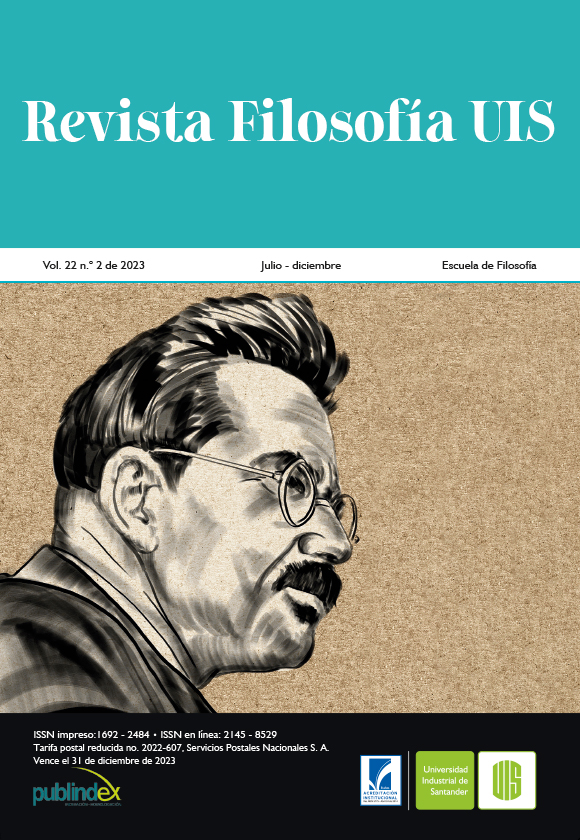Wittgenstein vs. Russell in the Blue Book. Deconstructing the causal theory of meaning
Published 2023-07-12
Keywords
- Meaning,
- understanding,
- causal conception,
- Blue Book,
- Russell
- Wittgenstein ...More
How to Cite
Copyright (c) 2023 Revista Filosofía UIS

This work is licensed under a Creative Commons Attribution 4.0 International License.
Abstract
This article assesses the scope of Wittgenstein’s Blue Book as a systematic critique against what has been called a "causal theory" of meaning, specifically the one formulated by Russell in The Analysis of Mind. Such evaluation proceeds, first, by clarifying the way in which the causal conception leads to understand meaning as the appropriate conduct according to the occurrence of psychological causal laws. Secondly, it develops Wittgenstein’s Blue Book critique against Russell’s conception in three steps: 1) the critique to the image hypothesis; 2) the rejection of the existence of an internal and hidden process; 3) the abandonment of a psychological notion of understanding to explain the concept of meaning. Finally, it will be clarified how this criticism aims to weaken the claim of explaining the concept of meaning scientifically, a claim that underlies the causal conception.
Downloads
References
- Addis, M. (2006). Wittgenstein. A guide for the perplexed. Continuum.
- Apostolova, I. (2017) Russell’s Two Theories of Memory. Russell: the Journal of Bertrand Russell Studies 37 (2), 307–33. https://doi.org/10.15173/russell.v37i2.3417
- Bernecker, S. (2001). Russell on mnemic causation. Principia: An international journal of Epistemology, volumen5. pp. 149-85.
- Biggs, M; Pichler, A. (1993). Michael Biggs and Alois Pichler Wittgenstein: Two Source Catalogues and a Bibliography Catalogues of the Published Texts and of the Published Diagrams, each Related to its Sources. [Working papers from the Wittgenstein archives at the University of Bergen].
- Bronzo, S. (2019). Demystifying Meaning in Horwich and Wittgenstein. En J. Conant y S. Sunday (Eds.) Wittgenstein on Philosophy, Objectivity, and Meaning (pp. 164-184). https://doi.org/10.1017/9781108151764.010
- Engelmann, M. (2012). Wittgenstein’s New Method and Russell’s the Analysis of Mind. Journal of Philosophical Research, Volume 37. pp. 283–311. https://doi.org/10.5840/jpr20123714
- Engelmann, M. (2013). Wittgenstein's Philosophical Development: Phenomenology,
- Grammar, Method, and the Anthropological View. Palgrave Macmillan.
- Frege, G. (2017). El Pensamiento. Una investigación lógica. En L. Placencia y R. Espinoza (Eds.) Escritos Lógico-Filosóficos (pp. 151-185). Colihue [original publicado en 1919].
- Glock, H-J. (2019). What Is Meaning? A Wittgensteinian Answer to an Un-Wittgensteinian Question. En J. Conant y S. Sunday (Eds.) Wittgenstein on Philosophy, Objectivity, and Meaning (pp. 185-210). https://doi.org/10.1017/9781108151764.011
- Green, K. (2007). Bertrand Russell, Language and Linguistic Theory. Continuum Studies in British Philosophy.
- Hauptli, B. W. (2014). Hauptli’s Lecture Supplement Introducing Wittgenstein’s Blue Book. http://faculty.fiu.edu/~hauptli/IntroductiontoWittgenstein'sBlueBook.html
- Pincock, C. (2006). Richard Semon and Russell’s Analysis of Mind. Russell: the
- Journal of Bertrand Russell Studies, 26 (2), 101–25. https://doi.org/10.15173/russell.v26i2.2097
- Russell, B. (1905). On Denoting. Mind, 14(56), 479-493. http://dx.doi.org/10.1093/mind/XIV.4.479
- Russell, B. (1970). Los problemas de la filosofía. (Traducción de Joaquín Xirau). Labor. [original publicado en 1912]
- Russell, B. (2001). The Analysis of Mind. Pennsylvania State University, Electronic Classics Series. (J. Manis, ed). [original publicado en 1921] http://dhspriory.org/kenny/PhilTexts/Russell/analysis-mind.pdf
- Schroeder, S. (2016). Grammar and Grammatical Statements. En H.-J. Glock y J. Hyman (Eds.) A Companion to Wittgenstein (pp. 252-268). https://doi.org/10.1002/9781118884607.ch14
- Stern, D. (1991) The "Middle Wittgenstein": From logical atomism to practical holism. Synthese, 87, 203-226.
- Stern, D. (2018). Wittgenstein and Moore on Grammar. En E.G. Stern (Ed.) Wittgenstein in the 1930s - Between the Tractatus and the Investigations (pp. 27-44). https://doi.org/10.1017/9781108349260.002
- Tully, R. (1988). Russell's Neutral Monism. Russell: The Journal of Bertrand Russell Studies, 8(1), 209-224.
- Wittgenstein, L. (1995). Tractatus Logico-Philosophicus. (D. F. Pears y B. F. McGuinness, trads.). Routledge [original publicado en 1922].
- Wittgenstein, L. (2001). Wittgenstein's Lectures Cambridge, 1932-1935. From the Notes of Alice Ambrose and Margaret Macdonald. (A. Ambrose, ed.). Prometheus Books.
- Wittgenstein, L. (2007). Gramática Filosófica. (L. Segura, trad.). Instituto de Investigaciones Filosóficas UNAM.
- Wittgenstein, L. (2009). Cuadernos Azul y Marrón. (F. Gracia, trad.). Tecnos.
- Wittgenstein, L. (2014) Escrito a Máquina [The Big Typescript TS 213]. (J. Padilla, trad.). Trotta.

